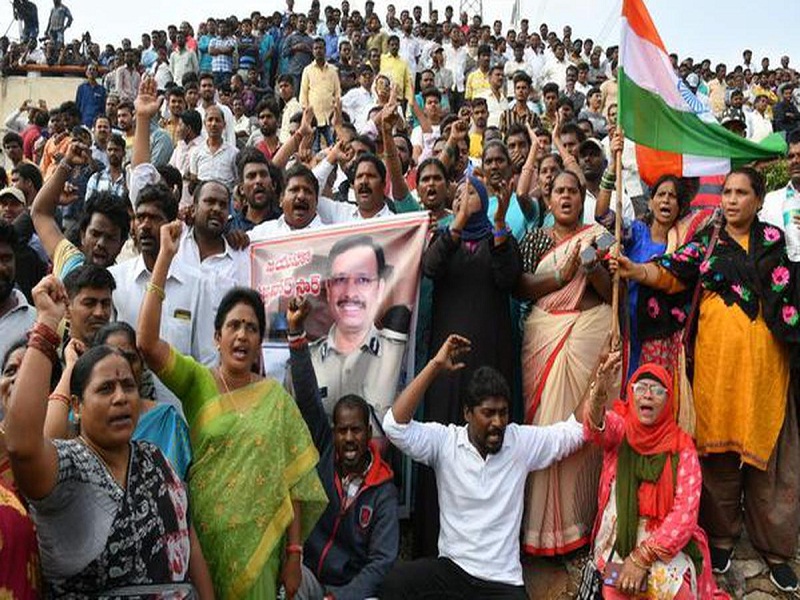Encounter with a truth uncovered

– Ranen Kumar Goswami-
Findings of the Supreme Court-appointed inquiry commission into the 2019 encounter killing of four accused in the rape and murder of a veterinarian in Telangana, confirm our worst fears about a section of law enforcers and their political masters. The three-member probe panel, comprising former Bombay High Court judge, Justice Rekha Baldota, former CBI Director Karthikeyan and headed by retired Supreme Court judge, Justice V. S. Sirpurkar, has found the accused were deliberately fired upon by the police and that the entire version of the cops was “concocted” and “unbelievable”. It also recommended that the ten police personnel involved in the encounter be tried for murder. The Commission was constituted by the apex court in December 12, 2019 to go into the alleged encounter killings of four persons accused of gang rape. It is now widely known as the Disha case.
Earlier reports in media say the broad version of most police officers during the SC panel hearing in November 2021 in Hyderabad was identical: The four accused allegedly threw soil in the policemen’s eyes when they were taken to the site for the reconstruction of crime, hit the cops with sticks leading to unconsciousness among some, and then two of the accused allegedly snatched pistols and started firing. The Additional Commissioner of Police then asked the accused to surrender, but they kept firing, forcing the police to retaliate.
Before we go further, let’s have a glance at what the “Guidelines Regarding Arrest,” issued by the National Human Rights Commission (NHRC) say. It says: “Arrest involves restriction of liberty of a person arrested and therefore infringes upon the basic human rights of liberty. Nevertheless the Constitution of India as well as international human rights law recognize the power of the State to arrest any person as a part of its primary role of maintaining law and order. The Constitution requires a just, fair and reasonable procedure established by law, under which alone such deprivation of law is permissible.” Article 22(1) of the Constitution provides that every person placed under arrest shall be informed as soon as possible about the ground of arrest and shall not be denied the right to consult and be defended by a lawyer of his choice. The Code of Criminal Procedure, CrPC, 1973 requires a police officer arresting any person to “forthwith communicate to him full particulars of the offence for which he is arrested or other grounds for such arrest.” The NHRC then points out, “in actual practice these requirements are observed more in breach.” And adds that the requirements of production of the arrested person before the court promptly, as mandated both under the Constitution and CrPC, are also not strictly adhered to. “A large number of complaints pertaining to human rights are in the area of abuse of police powers, particularly those of arrest and detention,” it points out. The human rights panel suggests that prompt action must be taken against errant police officers for violation of the guidelines, which should not be limited to departmental inquiries, but criminal justice mechanism should also be set in motion. 
Cut to the present. The 387-page report of the Sirpurkar Commission was made public on May 20, 2022, shortly after the Supreme Court turned down a plea of the Telangana Government to keep the document in a sealed cover. It then directed the panel’s secretariat to share the sealed cover report with the parties. The SC Bench, comprising Chief Justice N.V. Ramana and Justices Surya Kant and Hima Kohli, said: “This relates to the encounter case. There is nothing to keep here. The Commission has found someone guilty. We want to send the matter to the high court.”
Earlier, advocate Vrinda Grover, appearing for K. Sajaya, a journalist and documentary filmmaker, opposed the Telangana plea. She submitted that all the hearings were conducted in public, and depositions were also taken in public. She drew attention of the court that the report of Manipur encounter killings was shared with the parties concerned.
Justice Sirpurkar Commission, in its report, has expressed the opinion: “It cannot be believed that the deceased suspects have died due to the indiscriminate firing from the pistols allegedly snatched by them and it has to be held that all the deceased suspects died due to the injuries caused by the bullets fired by the police party.” The Commission points out that once the accused escaped and started running, as claimed by the police, it would be highly improbable that they would fire towards the police party while running as they would either run away, or stand and fire at the police party. It says that even if the accused could operate firearms, their aim would only be to escape and they would not stand and engage in an exchange of fire with the police personnel. Therefore it has to be held that the deceased suspects could not have fired and run away simultaneously.
The panel remarked that police cannot take shelter under the excuse of private defense: “Just as mob lynching is unacceptable, so is any idea of instant justice. At any point of time the rule of law must prevail. Punishment for crime has to be only by the procedure established by law.” Each one of the police personnel was responsible for the safe keeping of the four deceased suspects, it says and adds: “If either by acts or omissions they failed to fulfill their responsibility, then their common intention to cause deaths of the deceased suspects is established. Their conduct subsequent to the deaths of deceased suspects in falsifying the record would indicate that not only did they act in furtherance of common intention to give false information in order to screen the offenders, but also that they all acted with the common intention to cause deaths of the four deceased suspects.” 
Three of the accused persons were minors. They were Jollu Shiva, Jollu Naveen and Chintakunta Chennakeshavulu. Moreover, in violation of provisions of NHRC guidelines, Code of Criminal Procedure and Supreme Court judgement, police did not arrest the accused persons bearing accurate, visible and clear identification of their names, did not inform their family or friends about their arrest and did not care to execute an arrest memo while making the arrests.
The panel said: “After considering the entire material on record, we conclude that the deceased suspects have not committed any offence in connection with the incident on December 6, 2019, like snatching the weapons, attempt to escape from custody and firing at the police party.”
The entire episode reminds us of these lines from Shakespeare’s Merchant of Venice: “Thou art come to answer/ A stony adversary, an inhuman wretch/ Incapable of pity, void and empty/ From any dram of mercy,” (Act 4, Scene 1).
The Disha case has set a major precedent, somewhat renewing our belief in the oft-repeated warning that however high you are, the law is above you.
First Published in Assam Tribune on June 13,2022
[* The writer is a renowned Guwahati-based journalist.]







